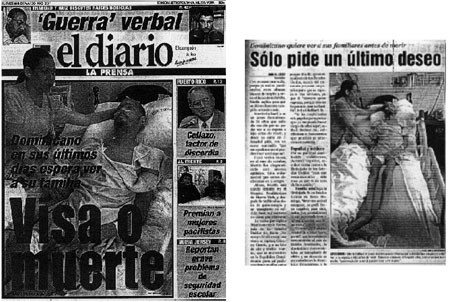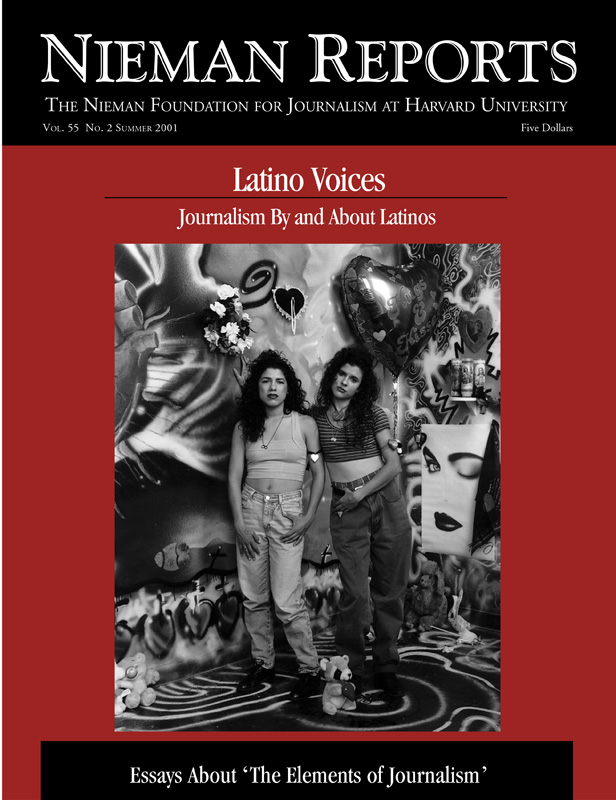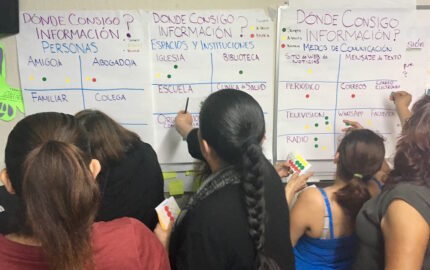
El diario was the only newspaper to report the case of a young Dominican man who died before his wife and son could get a humanitarian visa to leave the Dominican Republic to see him. Its stories and an editorial calling for a 24-hour turnaround time for such visas brought action by the governor and other state politicians to bring about this change.
At the start of this year I accepted a position as opinion page editor and editorial writer at el diario/ La Prensa, a daily Spanish-language newspaper in New York City. Its readership is located primarily in the tri-state area: New York, New Jersey, and Connecticut, but stretches as far north as Boston, Massachusetts.
I have been a journalist for 20 years and a Latina all my life, but this is the first time I’ve worked at a Spanish-language news organization. I joined el diario full time after serving last year as consulting editor of its Census 2000 coverage. The paper’s publisher, Rossana Rosado, and editor, Gerson Borrero, convinced me to come work for them. They want an opinion page that is strong and reflects the issues and concerns that are important to people who come from the many Latin American nations but are now living in the United States, as well as Latinos who have been here for many generations. And they want to return to the paper’s practice, abandoned a few years earlier, of regularly running editorials in Spanish and English.
During my years at various English-language newspapers, I heard negative stories about working at Spanish-language media. That it’s the “bush leagues,” with substandard reporting, writing and editing. That all reporters are on the take. That it’s all about blind advocacy at the expense of journalistic integrity.
What I have found is that there is no mystery or mystique about working in Spanish-language media. We do have journalism standards. We are competitive. We prefer to run stories that no one else has. We are a cross between a major mainstream daily and a community newspaper, with the community we serve being Latinos, those here in the states and also those in the Caribbean, Mexico, and Central and South America. We have the responsibilities of a major daily and the budget, salaries and resources of a community paper.
The staff at el diario includes veteran journalists and young reporters just starting out in their careers. We have skilled reporters, intelligent writers, eloquent columnists, and astute editors. The writing, at times, is more literary than we are used to in mainstream English-language journalism, but most of the time the prose can be fixed with a little editing. Sometimes reporters editorialize in their stories. We try to catch that before it gets into the newspaper—just as we do at English-language publications.
A friend of mine recently asked me what I like about working at el diario. I responded that now, when pitching a story about Latinos, “I don’t have to explain why it’s a story.” For the first time in my life, I don’t have to justify wanting to write about Latinos, because that is what we do at el diario. Period. It’s not until you don’t have that burden anymore that you realize what a heavy load it really is, a time-consuming and energy-consuming part of being a Latina journalist in mainstream media.
Spanish-language media has been around a long time in this country. Founded 88 years ago, el diario is one of the oldest Spanish language newspapers in the country. Advocacy for the Latino community is part of the job here. Indeed, the paper’s motto is “El campeon de los hispanos” (The champion for Hispanics). The paper’s Nuestros Países section provides daily stories from home from every Latin American nation as a way for people to keep up with the latest news in their home country. In sports, arts, business and community news, we report the news but also highlight the accomplishments of Latinos.
At mainstream newspapers journalists have convinced themselves that they are not advocates: They are simply vessels of information. Yet anyone who has taken a critical look at a newspaper or newsmagazine, a television or radio broadcast, or a news Web site, knows that these news organizations are not objective. Objectivity is an ideal, not a reality. Most of us strive to be fair and accurate, but the news is written for the people we perceive to be reading or watching it. All good journalism involves advocacy: We advocate for fairness and justice, for telling the truth and, yes, for giving voice to the voiceless. In Spanish-language media, the mission is to do that for the Latino community.
In New York, el diario started championing the cause of livery cab drivers who were getting killed on the job long before the mainstream media caught on to the story. At the beginning of a string of deaths more than a year ago, the paper began writing about the killings and has continued to produce stories not only about the crimes but about controversies surrounding possible remedies, including who should pay for the installation of bulletproof partitions and other safety measures. Livery cab drivers are mostly immigrants who operate their cabs in poor, black and Hispanic neighborhoods where historically the city’s yellow cabs have not gone.
Another recent example of a story championed by el diario, and not reported anywhere else, was the case of a young Dominican man in New York who had developed a blood disease and died before his wife and son could secure a humanitarian visa to leave the Dominican Republic and come see him one last time. Our reporting revealed that, despite a mountain of medical documents and letters from doctors and politicians in New York, the visa request was lost in bureaucratic red tape at the U.S. Consulate in the Dominican Republic. Our investigation also showed that this is routine for many immigrants seeking visas in similar emergencies. Our stories and an editorial calling for a 24-hour turnaround time for humanitarian visas brought this problem to the attention of Governor Pataki, who has joined state politicians and supporters in calling for this to happen.
As for the ambience at el diario, it is a professional office, a workplace, but it is also a little bit like home. When I walk into the newsroom in the mornings, there is Latin music playing on a radio or CD player at someone’s desk. In the afternoons, soon after the people on the night desk start drifting in, the rich fragrance of freshly brewed café espresso wafts through the office. They make it in a small cafetera (coffee pot) in the employee kitchen, which is called “La bodeguita del medio” (The little grocery store in the middle). And, of course, at el diario, there is no issue about speaking Spanish in the workplace. Aquí se habla español, con orgullo. Here we speak Spanish, with pride.
Evelyn Hernández is the opinion page editor at el diario/ La Prensa. She began her journalism career in 1980 as a reporter at the Fort Worth (Texas) Star-Telegram, then worked at The Miami Herald and New York Newsday.



